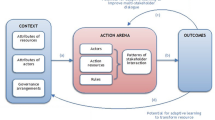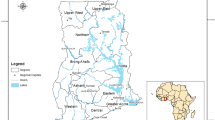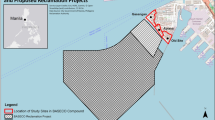Abstract
Wetland degradation and loss is continuing at an alarming rate in communal areas of Zimbabwe. Although poorly mapped at national scale, communal wetlands have been over utilized and undermanaged posing threats to the existence of these valuable ecosystems. The article examines the contestations and struggles in the use and protection of wetland ecosystems in communal areas of Zimbabwe, with special focus on Intunjambili wetland located in Matobo district. To solicit data, the study adopted a household questionnaire survey, semi-structured interviews with key informants and field observations. The Ostrom theory (1990) was used as a lens to explore how contestations and struggles at wetland scale undermine wise use, as guided by the Ramsar framework. The study findings show that the majority of the households (90%) revealed that conflicts related to wetland use are experienced in the area. Chi-square test results show that there is an association between household head’s socio-demographic characteristics (p < 0.05) and knowledge on conflicts in use and protection of communal wetlands. About 70% households highlighted that crop cultivation is a major threat to wetland protection as it is associated with excessive water abstraction that depletes ground water and disturbs the hydrology. The study recommends that profits obtained from the sale of horticultural products be reinvested to maintain the wetland, for example, buying fence to protect the wetland core area since it has been destroyed.










Similar content being viewed by others
Data availability
(data transparency) The datasets used and/or analysed during the current study are available from the corresponding author on reasonable request. All data produced from this study are provided in this manuscript.
References
Adekola O, Morardet S, De Groot R, Grelot F (2008) The economic and livelihood value of provisioning services of the Ga-Mampa wetland, South Africa. In 13th IWRA World Water Congress, Montpellier.
Ansoms AN, Wagemakers I, Walker MM, Murison J (2013) Land contestation at the micro scale: struggles for space in the African marshes. World Dev 54:243–252. https://doi.org/10.1016/j.worlddev.2013.08.010
Chiputwa B, Morardet S, Mano R (2006) Diversity of wetland-based livelihoods in Limpopo River Basin. In 7th Waternet Symposium “Mainstreaming IWRM in the Development Process”, Lilongwe, Malawi, 1–3 November 2006. Amsterdam, Netherlands: WaterNet. https://hdl.handle.net/10568/21599
Cox M (2010) Exploring the dynamics of social ecological systems: the case of the Taos valley acequias. Dissertation, Indiana University
Cox M, Arnold G, Villamayor Tomás S (2010) A review of design principles for community-based natural resource management. Ecol and Soci 15(4):38. http://www.ecologyandsociety.org/vol15/iss4/art38/
Creswell JW (2014) Research Design: quantitative, qualitative and mixed methods approaches, 4th edn. Sage Publications, London
Creswell JW (2015) A concise introduction to mixed methods research. University of Nebraska, Lincoln, pp 45–88
Dahlberg A (2005) Local resource use, nature conservation and tourism in Mkuze wetlands, South Africa: a complex weave of dependence and conflict. Geografisk Tidsskrift-Danish J Geo 105(1):43–55
Davidson NC, Fluet-Chouinard E, Finlayson CM (2018) Global extent and distribution of wetlands: trends and issues. Mar Freshw Res. https://doi.org/10.1071/MF17019
Dixon A, Hailu A, Semu T (2013) Local institutions, social capital and sustainable wetland management. In: Wood A, Dixon A, McCartney M (eds) Wetland management and sustainable livelihoods in Africa. Routledge, Oxon, pp 85–107
Erwin KL (2009) Wetlands and global climate change: the role of wetland restoration in a changing world. Wetl Ecol Manag 17(1):71–84
Feeny D, Berkes F, McCay BJ, Acheson JM (1990) The tragedy of the commons: twenty-two years later. Hum Ecol 18(1):1–19
Fennell LA (2011) Ostrom’s Law: property rights in the commons. Int J Commons 5(1):9–27. https://doi.org/10.18352/ijc.252
Finlayson CM, Pollard S (2009) A framework for undertaking wetland inventory assessment and monitoring in the Limpopo Basin Southern Africa. CPWF Project Report. CGIAR Challenge Program on Water and Food, Colombo
Frenken K, Mharapara I (eds) (2002) Wetland Development and Management in SADC Countries. FAO Sub-Regional Office for East and Southern Africa, Harare
Frischen J, Meza I, Rupp D, Wietler K, Hagenlocher M (2020) Drought risk to agricultural systems in Zimbabwe: a spatial analysis of hazard, exposure, and vulnerability. J of Sust 12(1):752. https://doi.org/10.3390/su12030752
Gardner RC, Barchiesi S, Beltrame C, Finlayson CM, Galewski T, Harrison I, Paganini M, Perennou C, Pritchard DE, Rosenqvist A, Walpole M (2015) State of the World’s Wetlands and Their Services to People: A Compilation of Recent Analyses. Ramsar Briefing Note No. 7. Ramsar Convention Secretariat, Gland
Government of Zimbabwe (GoZ) (2015) Fifth National Report to the Convention on Biological Diversity. Ministry of Environment, Water and Climate, Harare
Gray D (2013) Doing Research in the Real World, 3rd edn. Sage Publications, London
Hardin G (1968) The tragedy of the commons. Science 162(3859):1243–1248
Hove C, Chapungu L (2013) Human perceptions on degradation of wetland ecosystems: the case of Magwenzi Wetland in Chivi District, Zimbabwe. Gr J Geo Ear Sci 1(1):13–22
Maconachie R, Dixon AB, Wood A (2008) Decentralization and local institutional arrangements for wetland management in Ethiopia and Sierra Leone. Appl Geo 29(2):269–279. https://doi.org/10.1016/j.apgeog.2008.08.003
Madebwe V, Madebwe C (2005) An exploratory analysis of the social, economic and environmental impacts on wetlands: the case of Shurugwi District, Midlands Province, Zimbabwe. J Appl Sci Res 1(2):228–233
Mandishona E, Knight J (2019) Users’ perceptions and understanding of two urban wetlands in Harare, Zimbabwe. S Afr Geogr J 101(3):326–348
Mandishona E, Knight J (2022) Historical changes in wetland management legislation and practices in Zimbabwe, and their implications. Wetl Ecol Manag 30(6):1197–1211
Marambanyika T, Beckedahl H (2016) The missing link between awareness and the implementation of wetland policy and legislation in communal areas of Zimbabwe. Wetl Ecol Manag 24(5):545–563
Marambanyika T, Beckedahl H (2016b) Wetland utilisation patterns in semi-arid communal areas of Zimbabwe between 1985 and 2013 and the associated benefits to livelihoods of the surrounding communities. Trans R Soc S Afr. https://doi.org/10.1080/0035919X.2016.1152520
Marambanyika T, Beckedahl H (2016) Institutional arrangements governing wetland utilization and conservation in communal areas of Zimbabwe. Rev Soc Sci 2(1):1–17
Marambanyika T, Mutsiwegota C, Muringaniza KCR (2012) Importance of community participation in sustainable utilization of wetlands: case of Chebvute in Zvishavane District of Zimbabwe. J Enviro Sci and Eng B1:832–844
Masiyandima N, Edwards L (2018) Shaking Out or Shaking in: The impact of zimbabwe’s economic crisis on the country’s manufacturing sector allocative efficiency. ERSA working paper 749
Mbereko A, Chimbari MJ, Mukamuri BB (2007) An analysis of institutions associated with wetlands use, access and management in communal areas of Zimbabwe: a case study of Zungwi vlei, Zvishavane. Phys Chem Earth, Parts A/B/C 15–18:1291–1299. https://doi.org/10.1016/j.pce.2007.07.038
Mbereko A, Mukamuri BB, Chimbari MJ (2015) Exclusion and contests over wetlands used for farming in Zimbabwe: a case study of broad-ridge and broad-furrow tillage system on Zungwi Vlei. J Pol Ecol 21:322–338
McCartney M, Rebelo LM, Sellamuttu SS, De Silva S (2010) Wetlands, agriculture and poverty reduction. Integrated Water Management Institute, Colombo, Sri Lanka: International Water Management Institute. 39p. (IWMI Research Report 137). https://doi.org/10.5337/2010.230
Millennium Ecosystem Assessment (2005) Ecosystems and Human Well-being. Island press, Washington
Mioduszewski W, Okruszko T (2012) Protection of natural wetlands–the examples of conflicts. J Water Land Dev 16(1):35–42
Munangagwa CL (2009) The Economic decline of Zimbabwe. Gettysbg Economic Rev 3(9):110–129
Musasa T, Marambanyika T (2020) Threats to sustainable utilization of wetland resources in Zimbabwe: a review. Wetl Ecol Manag 28(4):681–696. https://doi.org/10.1007/s11273-020-09732-1
Ndhlovu N (2012) A Preliminary Assessment of the Wetland Biological Integrity in Relation to Land Use: A Case of the Intunjambili Wetland, Matobo District, Zimbabwe. University of Zimbabwe, Harare.
Ndiweni NJ, Gwate O (2013) Public perceptions of climate variability risks on wetland management: a case of ward 15 of Matobo North District, Zimbabwe. As J Soc Sci Hum 3(1):28–38
Nkhoma B, Kayira G (2015) Gender and power contestations over water use in irrigation schemes: Lessons from the lake Chilwa basin. Phys Chem Earth 2(1):15–30. https://doi.org/10.1016/j.pce.2015.10.007
Ostrom E (1990) Governing the Commons: The Evolution of Institutions for Collective Action. Cambridge Univ. Press, New York
Ostrom E (1992) Governing the Commons: the evolution of institutions for collective action, 32. Nat Res J 32(2):415–417
Ostrom E (1998) Coping with tragedies of the commons. Annu Rev Polit Sci 2:493–535
Ostrom E (2009) Building trust to solve commons dilemmas: taking small steps to test an evolving theory of collective action. In: Levin SA (ed) Games, Groups, and the Global Good. Springer, Berlin, pp 207–228
Ostrom E, Gardner R, Walker JM (1994) Rules, Games, and Common-Pool Resources. University of Michigan Press, Ann Arbor
Phethi MD, Gumbo JR (2019) Assessment of impact of land use change on the wetland in Makhitha village, Limpopo province, South Africa. Jamba 11(2):1–6. https://doi.org/10.4102/jamba.v11i2.693
Ramsar Convention on Wetlands (2018) Global Wetland Outlook: State of the World’s Wetlands and Their Services to People. Ramsar Convention Secretariat, Gland
Scoones I, Cousins B (1994) Struggle for control over wetland resources in Zimbabwe. Soc Nat Res 7:579–594. https://doi.org/10.1080/08941929409380890
Svotwa E, Manyanhaire IO, Makombe P (2008) Sustainable gardening on wetlands in the communal lands of Zimbabwe. Elec J Environ Agri Food Chem 7(3):2754–2760
van Laerhoven F, Ostrom E (2007) Traditions and trends in the study of the commons. Int J Commons 1(1):3–28. https://doi.org/10.18352/ijc.76
Wilson DS (2016) The Tragedy of the Commons: How Elinor Ostrom Solved One of Life’s Greatest Dilemmas. https://evonomics.com/tragedy-of-the-commons-elinor-ostrom/
Wood A, Dixon A, McCartney M (eds) (2013) Wetland Management and Sustainable Livelihoods in Africa. Routledge, Oxon
Zimbabwe National Geo-Spatial and Space Agency (2020) Zimbabwe Agro-Ecological Zones 2020: ZINGSA Geo-Spatial and Earth Observation Department. Mount Pleasant, Harare
Zimbabwe National Statistics Agency (2013) Zimbabwe Population Census. Zimbabwe Main Report, Harare
Zimbabwe National Statistics Agency (2015) Poverty Atlas Map. Zimbabwe National Statistics Agency, Harare
Zou Y, Duan X, Xue Z, Mingju E, Sun M, Lu X, Jiang M, Yu X (2018) Water use conflict between wetland and agriculture. J Env Manag 22(4):140–146
Funding
This article did not receive any form of funding.
Author information
Authors and Affiliations
Contributions
Conceptualization: TM and TU; methodology: TM and TU; Software: TU; validation: TM and TU.; formal analysis: TM and TU investigation, TM and TU, data curation, TU; writing—original draft preparation, TU and TM.; writing—review and editing, TM and TU visualization, TM. All authors have read and agreed to the published version of the manuscript.
Corresponding author
Ethics declarations
Competing interests
The authors declare that this is their own work and has not been sent for publication elsewhere. The authors also declare no conflict of interests in this research.
Ethical approval
Ethical issues were an important aspect of this research since they ensured that confidentiality and consent were upheld. Ethical clearance was sought from the Midlands State University to grant permission to carry out the survey. Permission to enter the study areas was sought from the Rural District Authority through a cover letter with the detailed aim and objectives of the study.
Consent to participate
All households included in this study gave written informed consent to participate in this research. If the household head was not available, the eldest family member capable of making decisions participated in the survey.
Consent for publication
All households provided informed consent to publish the data contained within this article.
Additional information
Publisher’s Note
Springer Nature remains neutral with regard to jurisdictional claims in published maps and institutional affiliations.
Rights and permissions
Springer Nature or its licensor (e.g. a society or other partner) holds exclusive rights to this article under a publishing agreement with the author(s) or other rightsholder(s); author self-archiving of the accepted manuscript version of this article is solely governed by the terms of such publishing agreement and applicable law.
About this article
Cite this article
Marambanyika, T., Musasa, T. Contestations and struggles in the use and protection of wetland ecosystems in communal areas of Zimbabwe: a case study of Intunjambili wetland in Matobo district. Wetlands Ecol Manage 31, 611–627 (2023). https://doi.org/10.1007/s11273-023-09937-0
Received:
Accepted:
Published:
Issue Date:
DOI: https://doi.org/10.1007/s11273-023-09937-0




